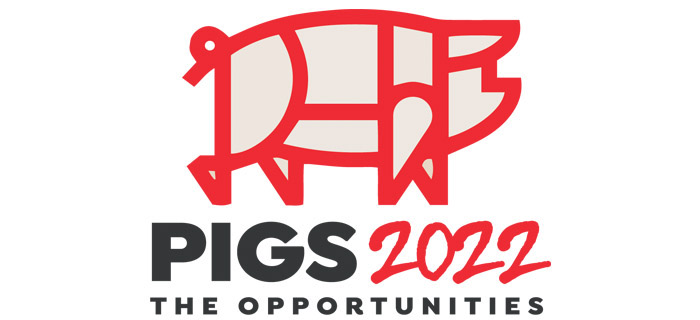A wealth of lucrative opportunities exist in Asia and the Far East for pork and pigmeat products. The UK pig sector must secure a stake in these burgeoning markets and sight its future beyond EU trade and whatever trade deal emerges post Brexit.
This was a clear message from day one of the of the Pigs 2022 – the Opportunities conference, organised by Pig World and AHDB Pork. The year-on-year growth in meat consumption worldwide will continue and, although volatility will remain a key feature of commodity markets, the outlook for higher quality, more sustainably produced meat products is more favourable with significant growth potential.
Nick Giordana, vice president (check) of the US National Pork Producers Council made ir clear the expanding US pork industry is targeting those markets. Middle class affluence will fuel growth in pork consumption and more so the market for high quality products, he said.
“In Asia this sector of society is set to double during the next 15 years and this offers significant opportunities for pork producers. I’m bullish about the future,” he said.
Richard Brown, director of GIRA, an international food consultancy, said the pig sector could afford to have more confidence that other livestock industries post-Brexit. Globally there are significant opportunities for meat producers, he said.
Brexit will create more volatility but the pig sector is less vulnerable than other livestock and arable sectors and is already trading globally in key regions where pigmeat consumption is seeing significant growth, he added.
He reiterated the message that world meat consumption is rising and pork and said consumers have a strong preference for pigmeat against other red meats. Poultry meat might appear to be leading the drive, due to economics and price, but pork is holding its own and still commands significant market share, which is what the UK pigmeat sector should be focusing on.
The burgeoning demand for good quality, sustainably produced pigmeat is already presenting credible market advantages for the UK pig industry and this needs to be built on. An EU trade deal was important, but he said the industry required a ‘positive ambience’ and needed to capitalise on it differentiated status
He said the UK pig sector must not get marginalised by a changing world as there was huge scope to add value to its products by committing to its differentiated status and sustainable qualities.
In an interactive survey, many producers within the audience of more than 200 people at the St Johns hotel, in Solihull, agreed and said they were ‘cautiously optimistic’ about the future.
There were mixed views on the likely implications of Brexit from speakers and from the floor in a lively Q&A session. On the one hand as the belief a post-Brexit trade environment would offer more global opportunities for British pork products. In this case differentiation will continue to be a market driver that would no doubt secure more export opportunities in China, which currently accounts for 27% of global pig trade, and more wisely in Asia. But in a competitive environment, businesses must also continue to focus on driving costs down and improving their efficiency of production.
But, against that, concerns were raised over various aspects of the post-Brexit future. “Brexit is the biggest challenge we face,” Cranswick chief executive Adam Couch told the audience, citing continued access to key export markets, like China, and access to labour as the biggest challenge for his company. The potential costs to exporters in terms of tariffs, but also non-tariff barriers, of failing to secure a Free Trade Agreement with the EU and moving to WTO rules were highlighted by consultant Ross Gordon.
Another recurring theme was the extent to which consumers should be driving industry decisions. The good news from McDonalds UK’s Connor McVeigh was consumer feedback consistently showed all customers’ favourite products included bacon. He also stressed the extent to which the fast food chain’s customers care about issues like animal welfare and the environment when it comes to the products they consume.




